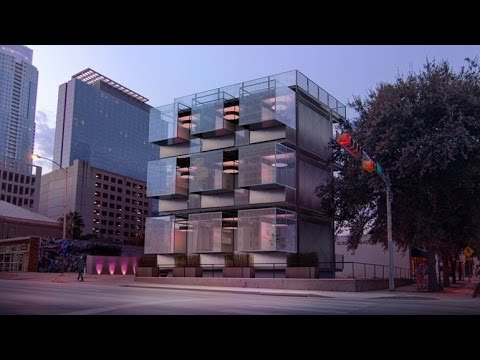The kind of person who moves into a dumpster to investigate sustainable living is sure to know a thing or two about downsizing. Dr. Jeff Wilson, aka Professor Dumpster, drew upon this experience to co-create Kasita: a modern and smart urban micro-home. Geared toward professional types, it can be moved to another location with relative ease.
The cost of purchase has not been revealed, but rent in Austin is expected to cost between $300 and $600. The amenities promised are pretty generous, and include a walk-in shower, refrigerator, convection oven and cooktop.
Still in the planning and prototype stage (although headed to Austin, TX soon), Kasita brings to mind elements of the tiny house and shipping container home communities. It comprises just 208 sq ft (19 sq ft) of floorspace, including a bathroom, a kitchenette, study, and a lounge. A cantilevering glass front section is a nice touch.
Available amenities include a walk-in shower, refrigerator, convection oven and cooktop, washer/dryer, and a queen-size bed that can be tucked away. The interior sports modular tiles that can be outfitted with shelving, gadgets, and furniture.
The home is smart too. “Your Kasita will welcome you home by adjusting the A/C, bringing up the lights and shades, and queueing your favorite playlist,” says the firm’s blurb. “Or, ask your Kasita to do something else (like rolling out the bed) via hands-free voice commands throughout.”
Each Kasita is a self-contained unit that slots into a larger “rack,” which provides the necessary plumbing and electricity. This modular system means that if you want to move, your home can follow. For example, if you live in San Francisco and want to move to Austin, you could access an app on your phone and request a move, the company would then take care of the rest (the rest involves removing the home from its rack before transporting it via truck to another rack with a vacant space).
While certainly ambitious, a plan is afoot to bring Kasita to market and the firm aims to build several units in Austin sometime in 2016. Additional units are also planned for 10 other cities the following year. The cost to buy hasn’t been revealed, but rent in Austin is expected to cost around US$600 per month. This seems cheap, but Kasita says it has an innovative business model that makes it doable. Future plans also include a student housing model.
Kasita are creating simple apartment block ‘scaffold shells’, which are easy to build on small lots of urban space generally classified as not developable. Essentially a 208 sq ft box of glass and steel, they can literally be picked up and moved b y a truck whenever — users can even do this by requesting a move through the companion app, without dealing with the usual moving stress. Though compact, the apartments comfortable, with smart tech throughout that will control air conditioning, music and bring out the fold-away bed, all by voice recognition. A unique tiling system allows users to customize walls towards their personal storage needs.
y a truck whenever — users can even do this by requesting a move through the companion app, without dealing with the usual moving stress. Though compact, the apartments comfortable, with smart tech throughout that will control air conditioning, music and bring out the fold-away bed, all by voice recognition. A unique tiling system allows users to customize walls towards their personal storage needs.
With Austin, Texas already lined up for the first Kasita homes in 2016, users will soon have a host of other cities across the US and beyond to pitch up whenever they feel like a change of location.
